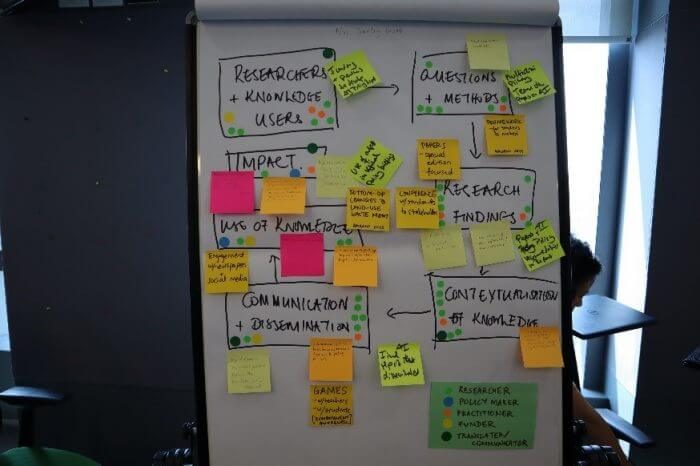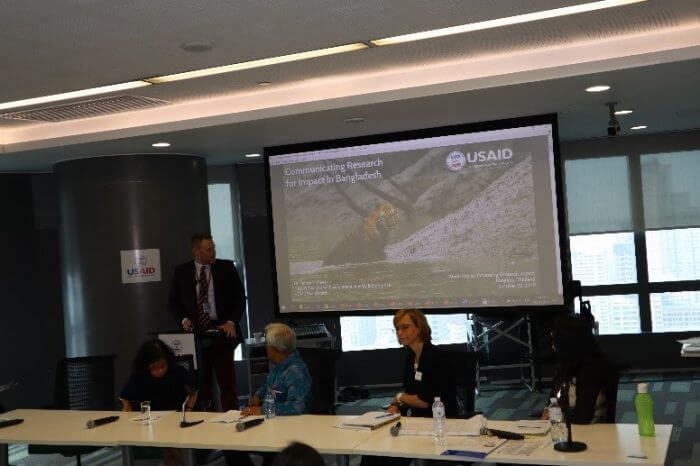Insights from the UKRI-USAID-UNESCAP 2nd Annual Workshop on Increasing Research Impact
Population Reference Bureau
POSTED December 4, 2019
|Education
Stephanie Perlson, Senior Policy Advisor, Population Reference Bureau
The world’s development challenges require that the most accurate evidence available is applied to finding solutions. But whose responsibility is it to make sure this evidence is properly understood, gets into the right hands, and will be turned into potential solutions? In fact, a variety of stakeholders must be involved in the research-to-action—or research translation (RT)—process
USAID’s Center for Development Research (CDR) and the UK Research and Innovations (UKRI) have partnered to realize their shared vision of increasing the impact of research as it is translated to policy. During the fall of 2018, CDR joined with UKRI to organize a regional workshop in Panama City, Panama where researchers, policymakers, donors, and NGOs could discuss the limitations and best practices in measuring the impact of research. CDR and UKRI aim to continue these annual convenings, and this past October, CDR used USAID’s Research Technical Assistance Center (RTAC) mechanism to organize a workshop on research translation in Bangkok, Thailand.

The objective of the UKRI-USAID-UNESCAP 2nd Annual Workshop on Increasing Research Impact: Research Translation was to create a joint learning opportunity for university and think-tank researchers, policymakers, and other development actors operating in South East Asia (SEA) to discuss best practices for translating research into policy and the challenges they face doing so. Since RTAC aims to close the research-to-action gap, workshop discussions ranged from the RT process in the SEA context to how to identify and create opportunities for research translation to how to engage the necessary stakeholders to finding ways to package research for stakeholders so that it is acted upon.
Learning from each other
The breakout groups and speakers’ presentations provided participants—who came from a variety of technical sectors across the region—the chance to share their experiences translating research-to-action from diverse perspectives. This sparked participants’ curiosity—and elicited creative ideas—on how to adapt another sector’s approach to one’s own research-to-action challenges.
The main RT challenges discussed include:
- Many factors influence RT, such as the messenger’s reliability and credibility, as well as the message itself—how it’s disseminated and to whom.
- No one sector or individual is responsible for the overall knowledge dissemination process.
- Striking the balance between contextualized approaches, specific to one setting, but also having a large enough sample size to generate findings that might be applicable and adaptable to another context, is essential.
- Policymakers often reject “lessons learned” from other countries, saying it’s not relevant for them.
Some innovative solutions that emerged:
- Engage policymakers and other relevant stakeholders—including beneficiaries—at the outset to make sure the research question addresses a need they actually face.
- Work with policymakers to draft evidence-based legislation that addresses relevant concerns.
- Encourage the use of Citizen Report Cards to allow public officials to report back to communities.
- Incorporate the Sustainable Development Goals in a country’s National Development Plan
Everyone has a role to play
Breakout groups noted the power of convening all stakeholders in the RT process. As most issues do not fall clearly within one sector, like health or education, efforts to communicate the message are required from multiple sectors—no one sector can do it alone. They noted, too, the role of civil society and community-based organizations in ensuring that community interests are represented, and that the latest research reaches them.

Translating learning into action
During small group discussions and Q&A sessions, each technical group explained what they need from the others to advance change. For example, participants from the policy community highlighted the need for new and relevant evidence they can use, in practical ways. Another key point was whether the researchers sufficiently took into account existing laws and policies. The researchers noted the need to “teach” policymakers how to understand research, and everyone agreed that policymakers and practitioners need researchers to provide the evidence to support their initiatives. It was also agreed that donors need—and want—to be informed about the concerns of local communities, so the research they invest in is more likely to contribute to finding pragmatic solutions to development challenges.
The consensus from the entire group was that everyone—policymakers, researchers, advocates, practitioners, and donors—has a role to play to make the intended multisectoral changes happen.
